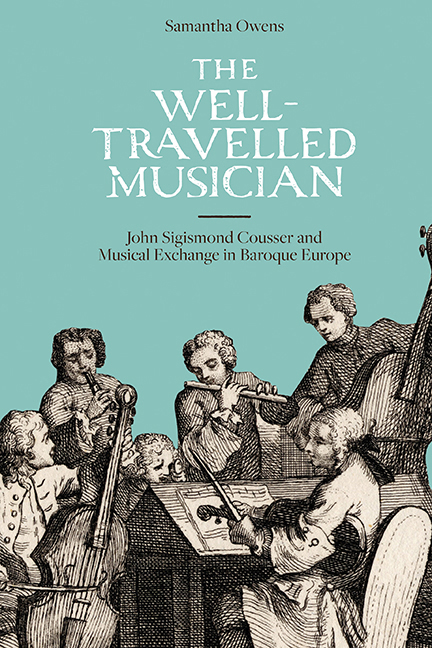Book contents
- Frontmatter
- Dedcation
- Contents
- List of Tables
- Preface
- Abbreviations
- Notes on Sources
- Introduction: John Sigismond Cousser and his ‘Commonplace Book’
- 1 Hungarian Beginnings and the Adoption of French Musical Style
- 2 Kapellmeister at the Wolfenbüttel Court and Braunschweig Opera House
- 3 Ariadne to Porus: Cousser's Braunschweig Operas
- 4 ‘The Incomparable Director’ in Hamburg, Nuremberg and Augsburg
- 5 Heliconische Musen-Lust: Opera at the Württemberg Court
- 6 ‘Il Paradiso terrestre’? Cousser in London
- 7 ‘Fortune not Blind’: Music for Dublin Castle
- 8 ‘Our Concert’: A Musician at Home
- 9 Cousser's ‘collection of fine musick’ and the Practicalities of Musical Exchange
- Appendix 1 Summary of the Contents of Cousser's ‘Commonplace Book’
- Appendix 2 Cousser's Address Book
- Appendix 3 Cousser's Books of Cantatas, Madrigals, Duets and Serenatas
- Appendix 4 Cousser's Inventory of Ouverture Incipits
- Appendix 5 Transcription of Cousser's Notes for his 1716 Trip to London and the Continent
- Bibliography
- Index
- Titles listed here were originally published under the series title Music in Britain, 1600–1900
- New titles published under the series title Music in Britain, 1600–2000
1 - Hungarian Beginnings and the Adoption of French Musical Style
Published online by Cambridge University Press: 30 August 2019
- Frontmatter
- Dedcation
- Contents
- List of Tables
- Preface
- Abbreviations
- Notes on Sources
- Introduction: John Sigismond Cousser and his ‘Commonplace Book’
- 1 Hungarian Beginnings and the Adoption of French Musical Style
- 2 Kapellmeister at the Wolfenbüttel Court and Braunschweig Opera House
- 3 Ariadne to Porus: Cousser's Braunschweig Operas
- 4 ‘The Incomparable Director’ in Hamburg, Nuremberg and Augsburg
- 5 Heliconische Musen-Lust: Opera at the Württemberg Court
- 6 ‘Il Paradiso terrestre’? Cousser in London
- 7 ‘Fortune not Blind’: Music for Dublin Castle
- 8 ‘Our Concert’: A Musician at Home
- 9 Cousser's ‘collection of fine musick’ and the Practicalities of Musical Exchange
- Appendix 1 Summary of the Contents of Cousser's ‘Commonplace Book’
- Appendix 2 Cousser's Address Book
- Appendix 3 Cousser's Books of Cantatas, Madrigals, Duets and Serenatas
- Appendix 4 Cousser's Inventory of Ouverture Incipits
- Appendix 5 Transcription of Cousser's Notes for his 1716 Trip to London and the Continent
- Bibliography
- Index
- Titles listed here were originally published under the series title Music in Britain, 1600–1900
- New titles published under the series title Music in Britain, 1600–2000
Summary
❧ From Pressburg to Stuttgart
ALTHOUGH very little information survives concerning the early life of Johann Sigismund Kusser (Cousser), his earliest musical experiences surely centred on Lutheran sacred music. His father, Ján (Johann) Kusser (d. 1695), was – in the words of Johann Gottfried Walther – a ‘renowned cantor and composer’ based in Pressburg, Hungary (today Bratislava, capital city of Slovakia). Born on 11 November 1626, in the town of Ödenburg (now Sopron), Ján Kusser described the initial stages of his career in a letter written in 1674:
… in my youth, after having survived various travels undertaken for the purpose of study, some twenty years ago I returned once more to Hungary, and was called, first of all, to Rust [today in Austria] on the Hungarian Lake [Lake Neusiedl/Fertő] as head teacher and organist; then subsequently to Ödenburg as cantor …
Several days later, in a face-to-face interview with Stuttgart consistorial councillors, Kusser reiterated this information, stating that he had been employed in Rust for three years (a period that must date from c. 1653 to 1655) and in Ödenburg for two years (c. 1655–57). Other records indicate that between 1649 and 1653 Kusser worked as succentor and assistant teacher at the Latin school in Kremnitz (Kremnica, now in Slovakia), while accounts held by the Stadtarchiv in Rust confirm that he received a number of payments as organist there in 1653.
A particularly significant step in Ján Kusser's career took place some time before March 1657, when he was called from his post in Ödenburg to replace Samuel Capricornus as music director to the Lutheran churches of the Royal Free City of Pressburg. Located in a picturesque setting on the banks of the Danube and Morava rivers, Pressburg was home to a sizeable German-speaking community. In addition to the main Lutheran church, the Trinitatiskirche (consecrated in 1638), a second, much smaller church was in the process of construction for Pressburg's Slovak and Hungarian-speaking Lutheran community (nowadays the town's Catholic Ursulinerkirche). Capricornus had been strongly influenced by the compositions of Heinrich Schütz and Giacomo Carissimi, as well as by the imperial Kapellmeister Giovanni Valentini and Antonio Bertali during a period spent in Vienna in the late 1640s, so that the Trinitatiskirche's music collection included an impressive selection of masses, sacred concertos and psalm settings by both German and Italian composers.
- Type
- Chapter
- Information
- The Well-Travelled MusicianJohn Sigismond Cousser and Musical Exchange in Baroque Europe, pp. 9 - 27Publisher: Boydell & BrewerPrint publication year: 2017



